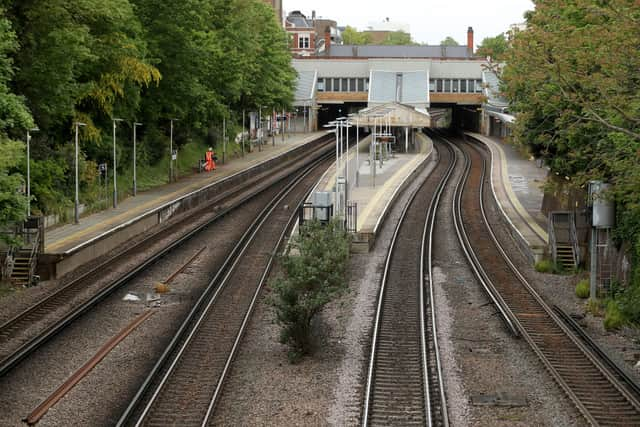Why are rail workers striking? What RMT staff are calling for - and how much are they paid
and live on Freeview channel 276
Millions of travellers around Britain are facing major disruption as the biggest rail strike in 30 years takes effect.
Lines around the country are shut and services cancelled as 50,000 members of the RMT union take industrial action.
Advertisement
Hide AdAdvertisement
Hide AdTravellers on Tuesday 21 June - the first of three days of planned action - reported major problems as only around one in five trains ran, with disruption expected throughout the week.
The action, on 21, 23 and 25 June, is the biggest rail strike in 30 years and threatens to bring the country to a halt, affecting commuters and those heading to a number of major cultural and sporting events, including Glastonbury Festival.
Rail bosses have warned that the action could further jeopardise services used by millions of commuters and travellers but the union says it has been left with no choice but to take action.


Why is the RMT striking?
The union says it is taking action over fears for staff pay, job security and safety concerns.
Advertisement
Hide AdAdvertisement
Hide AdIt claims that staff are facing a real-world pay cut in the face of soaring inflation and that Network Rail and train operators are seeking to cut costs by shedding staff.
RMT general secretary Mick Lynch told LBC’s Tom Swarbrick that the union wanted a pay rise of between 7% and 8% for its members to keep up with the rising cost of living.
The union says Network Rail has offered a 2% rise, with the possibility of a further 1% if the union accepts job cuts and changes to working practices.
Mr Lynch said: "Most of our members haven’t had a pay rise in two or three years. Our people are getting poorer while their jobs are under threat. And if you survive the jobs cull that they’ve got in mind your working conditions will be diluted and you’ll be worse off.”
Advertisement
Hide AdAdvertisement
Hide AdMr Lynch said that conditions being offered to new staff would see them work longer hours and earn less than existing staff.
Network Rail reportedly wants to cut 2,500 jobs from what the RMT says are “safety critical” maintenance roles as it looks to cut £2 billion in expenditure. Network Rail insists there would be no compulsory redundancies but more flexible timetabling of staff and asking some to multitask.
There are also suggestions that ticket offices around the country could be closed, potentially threatening jobs.
What do rail bosses say?
Network Rail, train operators and the Government all say that the railways need to be modernised in order to survive.
Advertisement
Hide AdAdvertisement
Hide AdPassenger numbers are down 25% on pre-pandemic figures and the operators say that without efficiency savings they will have to put up ticket prices or seek further support from the Government, which provided £16bn of aid to protect staffing levels during the pandemic.
A spokesperson for the Rail Delivery Group, which represents the rail industry, said: “Every business wants to support their staff and the railway is no exception. But, as an industry we have to change our ways of working and improve productivity to help pay our own way – the alternatives of asking taxpayers to shoulder the burden or passengers to pay higher fares when they too are feeling the pinch simply isn’t fair.”
Chief secretary to the Treasury Simon Clarke said that the demands for an “inflation busting” pay rise could not be sustained in the current climate.
He said: “No-one is suggesting there’s some kind of pay freeze required here, we all want to see a sensible pay increase.
Advertisement
Hide AdAdvertisement
Hide Ad“We have an inflation problem in this country … if we don’t want that problem to either intensify or prolong itself, then we need to be sensible around pay awards.
“In the current landscape of inflation at 9% bordering 10%, it is not a sustainable expectation that inflation can be matched in payoff. That’s not something that’s going to be seen across the private sector as well as the public sector.
How much are rail workers paid?
There is some disagreement over how much rail workers are paid.
Transport Secretary Grant Shapps told the House of Commons on 15 June that the median rail worker salary in 2021 was around £44,000. However, the RMT says earnings of its members are significantly lower than this.
Advertisement
Hide AdAdvertisement
Hide AdThe median salary is obtained by taking the central value in a ranked list of all salaries across the sector, rather than the average.
The figure quoted by Mr Shapps is based on data from the Office for National Statistics (ONS) and includes train drivers, who are not represented by the RMT but by Aslef, but excludes cleaners, who are represented by the RMT.
The median salary of £43,747 quoted by the ONS is based on salaries in five rail-related sectors:
- Travel assistants, such as guards, ticket collectors and information staff (£33,310)
- Construction and maintenance operatives (£34,998) - they lay and repair tracks
- Transport operatives such as signallers and drivers’ assistants (£48,750)
- Train and tram drivers (£59,189)
- Rail and rolling stock builders and repairers (£46,753)
According to the BBC, removing train drivers from the calculation gives a median salary of £37,500.
Advertisement
Hide AdAdvertisement
Hide AdHowever, the RMT says that if the calculations were to include the 10,000 cleaning staff it represents, the median salary would be around £33,000.
That compares to an official median salary of £25,971 for all workers in the UK last year.
Comment Guidelines
National World encourages reader discussion on our stories. User feedback, insights and back-and-forth exchanges add a rich layer of context to reporting. Please review our Community Guidelines before commenting.
